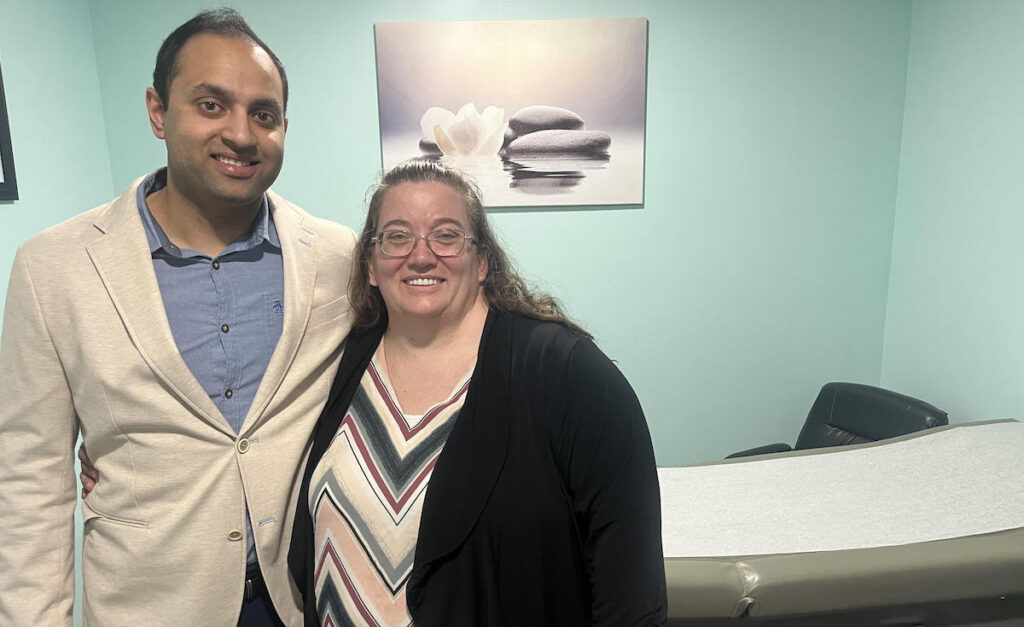
ADRIAN — When the worst happens, having the right resources can make all the difference.
Making sure survivors have the care and resources they need is the mission of Safe Haven, the newly founded trauma clinic specializing in sexual assault care in downtown Adrian. Launched by forensic nurse and nurse practitioner Rachelle Vanaken, Safe Haven focuses on on helping victims of sexual assault, domestic violence, elder abuse and other intimate traumas, and served its first patient on Christmas Day.
The kind of cases Safe Haven specializes in can make finding the right care difficult. A typical hospital experience can be traumatic, Vanaken said. Having to recount what happened to multiple care providers while having invasive exams done with minimal privacy can make an already horrific experience even worse for many survivors.
“A lot of people don’t want to go to the ER for something like this,” Vanaken said. “There are multiple counties in Michigan and multiple counties in different states that use outpatient clinics and it was always a dream. Someday, there’s going to be an outpatient clinic here in Lenawee because this is what’s needed.”
Safe Haven was thoughtfully designed with the survivor experience in mind. A part of the Adrian Counseling and Psychiatric Clinic (ACPC) facility located in the Lenawee Professional Center in downtown Adrian, Safe Haven has its own entrance off the rear of the building to ensure patient privacy when they seek care. Inside, the walls are painted a calming blue, the floors a mellow gray wood. There are uplifting pieces of art on the walls, a comfortable waiting room and — perhaps most importantly — the exam rooms are fully private, with doors instead of curtains like you often find in hospital emergency rooms.
Vanaken took careful consideration of all these factors when designing the space and she, alongside ACPC owner Sarang Patel, invested significant time and money into making the clinic into exactly what patients need. Patel provided the initial investment while Vanaken and her family spent hours painting, putting down floors, and building storage to get the clinic ready to serve Lenawee County.
For both Vanaken and Patel, it was an easy investment to make. The need, they said, for something like Safe Haven in this region is apparent.
“Working at ACPC, you find that trauma is ingrained in a lot of patients,” Patel said.
He said the clinic is about “getting as many people help as possible.”
“When Rachelle said it’s 24/7, it’s on call and there’s no wait … I was in. Let’s get people in. There’s so much abuse and so much trauma, and there’s not enough resources.”
Safe Haven and ACPC take a holistic approach to treatment. When a patient calls the 24/7 number, a sexual assault nurse examiner answers. They talk with the patient, assess their history and arrange to meet them at the clinic. Once on site, the SANE-certified provider will conduct the exam — no recounting the trauma over and over as can often happen in a hospital environment — and immediately provide appropriate medications for sexually trasmitted infection, HIV and pregnancy prevention. They also discuss options for what comes next. This can include ensuring the patient has a safe place to go if the assault was perpetrated by someone in their home, getting them scheduled with a mental health professional, or working with police if the survivor decides they want to report their assault.
A key aspect of that part of care is whether or not the patient wants to report the assault. As Vanaken says, she works with the police, not for them. Reporting is always up to the survivor, not the provider, and Safe Haven can provide a forensic exam to gather evidence without immediately going to police. This gives patients the evidence they will need if they choose to report the assault in the future.
Supporting patients goes beyond providing care. Safe Haven also wanted to ensure that there were no barriers to those needing care, including cost. That means that sexual assault survivors who seek treatment at Safe Haven may have expenses covered by a state of Michigan program called SAFE Response (the SAFE stands for Sexual Assault Forensic Exam). Those who are insured can use their insurance but they don’t have to, just in case patients don’t want the person who holds the insurance to know they sought treatment for assault.
“I want people to know that we’re here, we’re available, and if they happen to be a victim of violence, they can call,” Vanaken said. “I don’t care if they’re undocumented. There’s a lot of addiction that goes along with being in a place that someone can take advantage of you — come talk with me about it. Don’t let it be a sticking point, we have resources.”
With the additional resources at ACPC, Vanaken and Patel are ready and equipped to help anyone who might need it, taking empathy and the trauma of assault into consideration every step of the way. And for Vanaken in particular, Safe Haven is fulfilling her own dream as well as a need in the community.
“This has been a vision,” Vanaken said. “I just want people to know that we’re here with open arms, no questions asked. Call and we will help you.”
If you need assistance from Safe Haven, call 517-260-1948 to speak to a SANE-certified care provider.

